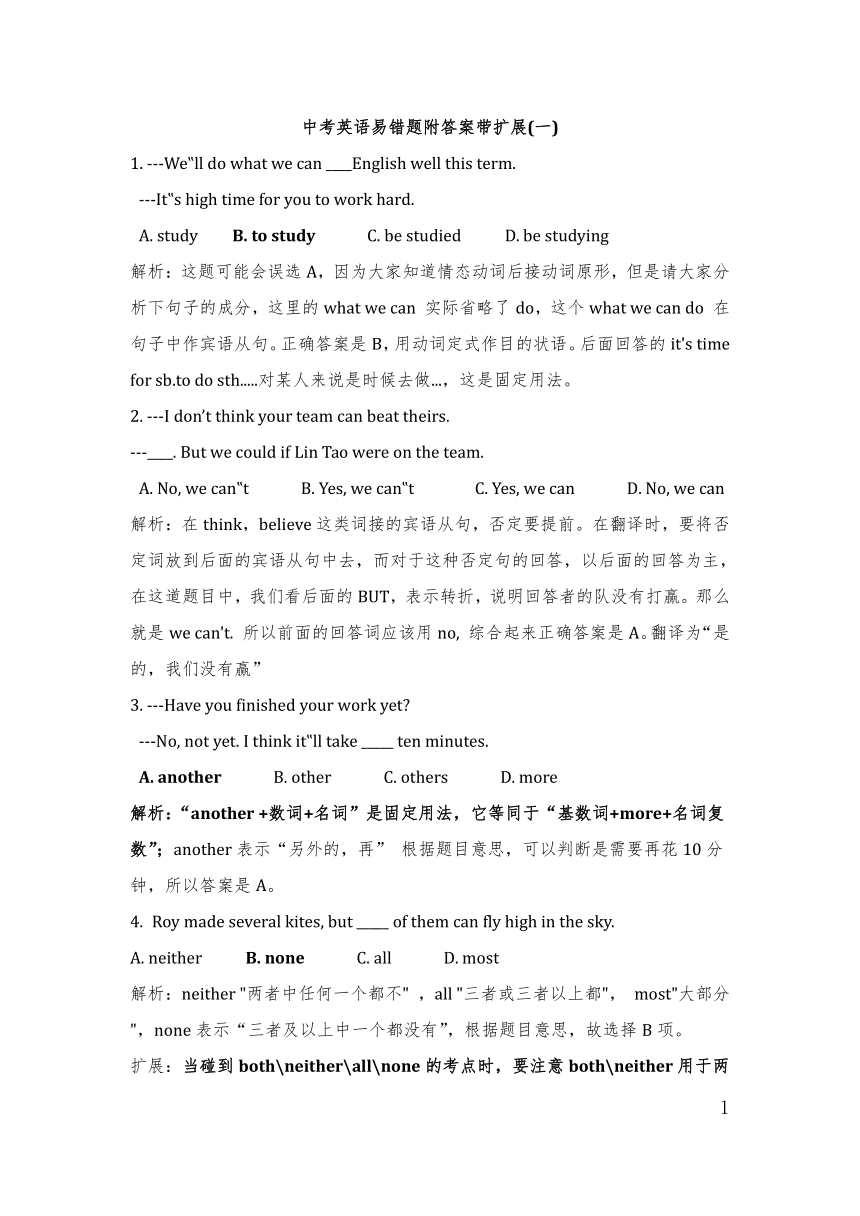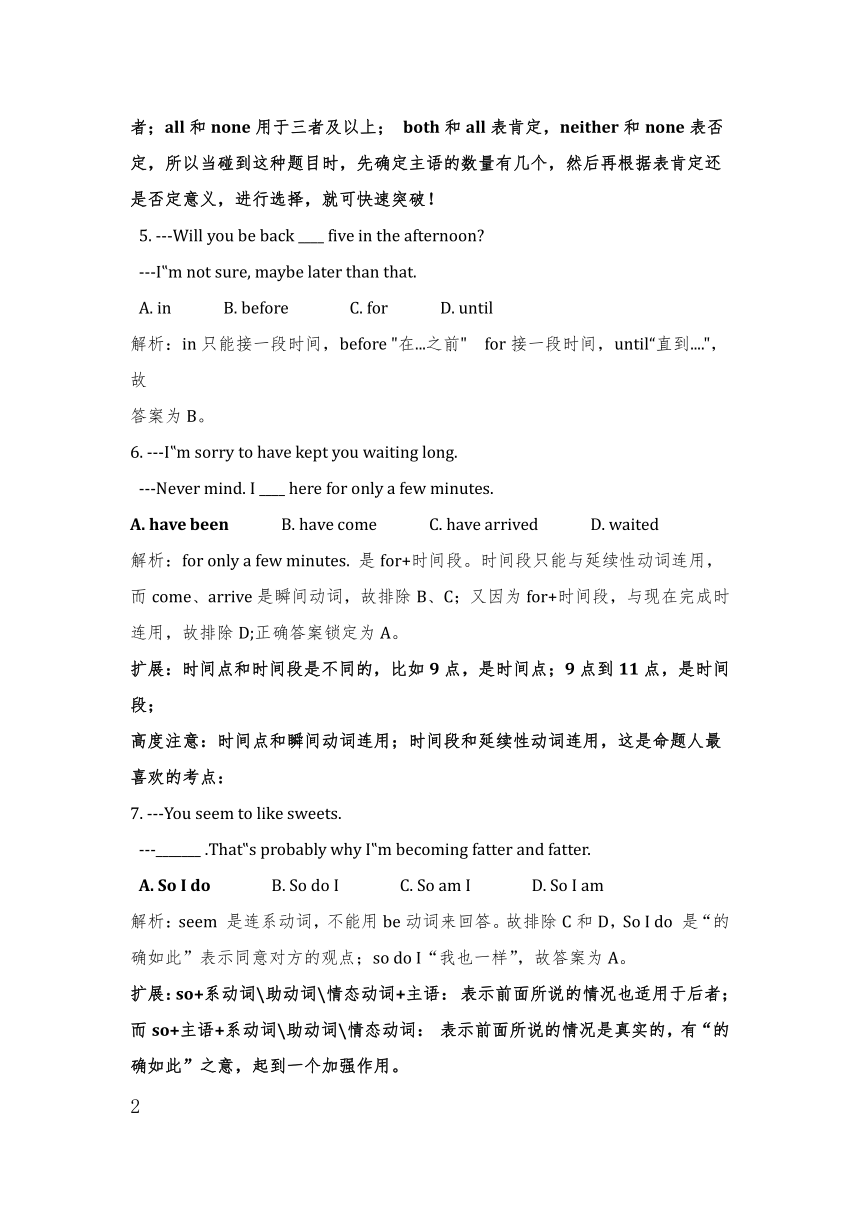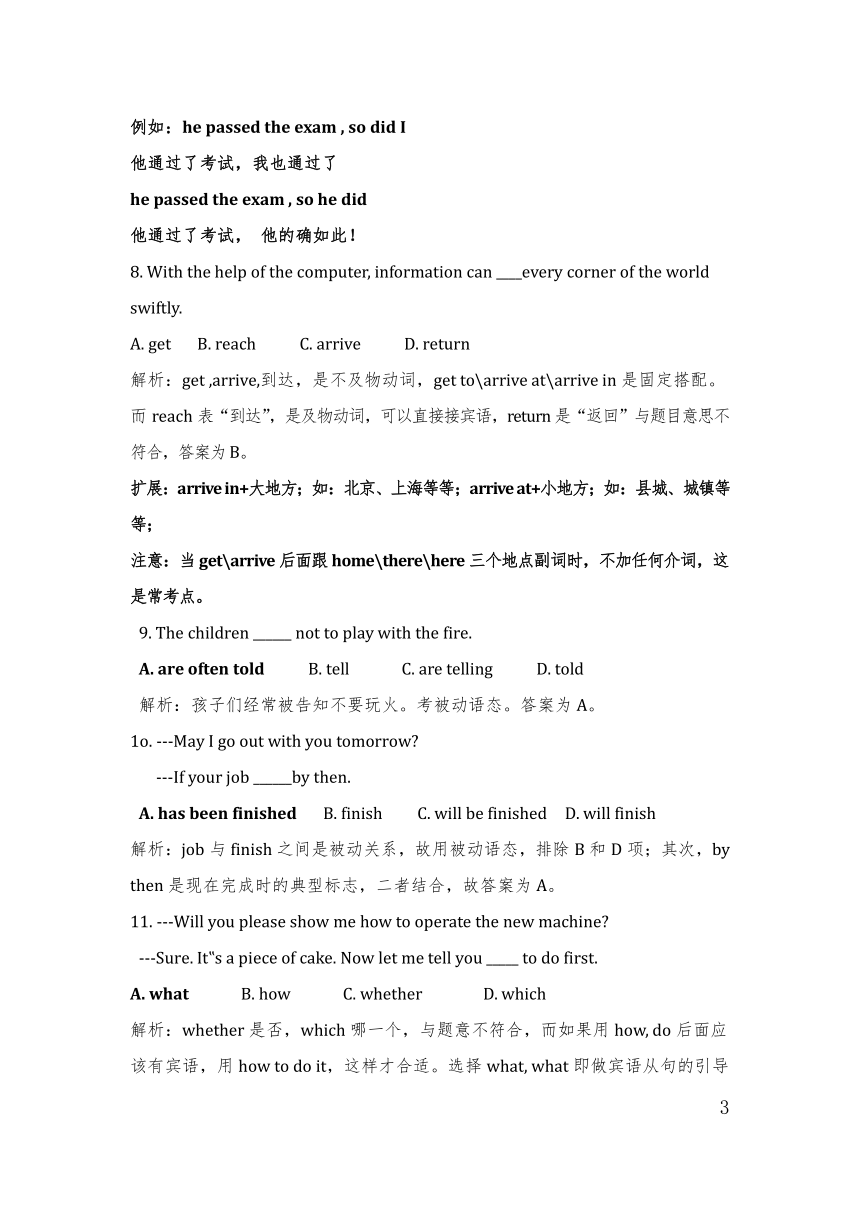2022年中考英语易错题及扩展(一)
图片预览



文档简介
中考英语易错题附答案带扩展(一)
1. ---We ll do what we can ____English well this term.
---It s high time for you to work hard.
A. study B. to study C. be studied D. be studying
解析:这题可能会误选A,因为大家知道情态动词后接动词原形,但是请大家分析下句子的成分,这里的what we can 实际省略了do,这个what we can do 在句子中作宾语从句。正确答案是B,用动词定式作目的状语。后面回答的it's time for sb.to do sth.....对某人来说是时候去做...,这是固定用法。
2. ---I don’t think your team can beat theirs.
---____. But we could if Lin Tao were on the team.
A. No, we can t B. Yes, we can t C. Yes, we can D. No, we can
解析:在think,believe这类词接的宾语从句,否定要提前。在翻译时,要将否定词放到后面的宾语从句中去,而对于这种否定句的回答,以后面的回答为主,在这道题目中,我们看后面的BUT,表示转折,说明回答者的队没有打赢。那么就是we can't. 所以前面的回答词应该用no, 综合起来正确答案是A。翻译为“是的,我们没有赢”
3. ---Have you finished your work yet
---No, not yet. I think it ll take _____ ten minutes.
A. another B. other C. others D. more
解析:“another +数词+名词”是固定用法,它等同于“基数词+more+名词复数”;another表示“另外的,再” 根据题目意思,可以判断是需要再花10分钟,所以答案是A。
Roy made several kites, but _____ of them can fly high in the sky.
A. neither B. none C. all D. most
解析:neither "两者中任何一个都不" ,all "三者或三者以上都", most"大部分",none表示“三者及以上中一个都没有”,根据题目意思,故选择B项。
扩展:当碰到both\neither\all\none的考点时,要注意both\neither用于两者;all和none用于三者及以上; both和all表肯定,neither和none表否定,所以当碰到这种题目时,先确定主语的数量有几个,然后再根据表肯定还是否定意义,进行选择,就可快速突破!
5. ---Will you be back ____ five in the afternoon
---I m not sure, maybe later than that.
A. in B. before C. for D. until
解析:in只能接一段时间,before "在...之前" for接一段时间,until“直到....",故
答案为B。
6. ---I m sorry to have kept you waiting long.
---Never mind. I ____ here for only a few minutes.
A. have been B. have come C. have arrived D. waited
解析:for only a few minutes. 是for+时间段。时间段只能与延续性动词连用,而come、arrive是瞬间动词,故排除B、C;又因为for+时间段,与现在完成时连用,故排除D;正确答案锁定为A。
扩展:时间点和时间段是不同的,比如9点,是时间点;9点到11点,是时间段;
高度注意:时间点和瞬间动词连用;时间段和延续性动词连用,这是命题人最喜欢的考点:
7. ---You seem to like sweets.
---_______ .That s probably why I m becoming fatter and fatter.
A. So I do B. So do I C. So am I D. So I am
解析:seem 是连系动词,不能用be动词来回答。故排除C和D,So I do 是“的确如此”表示同意对方的观点;so do I“我也一样”,故答案为A。
扩展:so+系动词\助动词\情态动词+主语: 表示前面所说的情况也适用于后者;
而so+主语+系动词\助动词\情态动词: 表示前面所说的情况是真实的,有“的确如此”之意,起到一个加强作用。
例如:he passed the exam , so did I
他通过了考试,我也通过了
he passed the exam , so he did
他通过了考试, 他的确如此!
8. With the help of the computer, information can ____every corner of the world swiftly.
A. get B. reach C. arrive D. return
解析:get ,arrive,到达,是不及物动词,get to\arrive at\arrive in是固定搭配。而reach表“到达”,是及物动词,可以直接接宾语,return是“返回”与题目意思不符合,答案为B。
扩展:arrive in+大地方;如:北京、上海等等;arrive at+小地方;如:县城、城镇等等;
注意:当get\arrive后面跟home\there\here三个地点副词时,不加任何介词,这是常考点。
9. The children ______ not to play with the fire.
A. are often told B. tell C. are telling D. told
解析:孩子们经常被告知不要玩火。考被动语态。答案为A。
1o. ---May I go out with you tomorrow
---If your job ______by then.
A. has been finished B. finish C. will be finished D. will finish
解析:job与finish之间是被动关系,故用被动语态,排除B和D项;其次,by then是现在完成时的典型标志,二者结合,故答案为A。
11. ---Will you please show me how to operate the new machine
---Sure. It s a piece of cake. Now let me tell you _____ to do first.
A. what B. how C. whether D. which
解析:whether是否,which哪一个,与题意不符合,而如果用how, do后面应该有宾语,用how to do it,这样才合适。选择what, what即做宾语从句的引导词,又在宾语从句中做动词do的宾语,这样两全其美,故选择A项。
12. ---My trousers are______ .
---I ll buy you a new pair.
A. wore out B. worn out C. wearing out D. sold out
解析:wear out 穿坏,sell out卖完。裤子是被穿坏,是被动的,所以用被动语态,答案B。
13. ---What do you think of these two books
---_____ of them are interesting. And I ve read them several times.
A. Both B. Neither C. None D. Either
根据题意,是两本书,both“两者都”neither"两者都" none"一个也没有" either"两者中任何一个",从后面的句子可知,表示肯定,故答案为A。
14. ---The artist has got _____ much work to do that he hardly has time to help his wife with the housework.
---That s true. Even on Sundays he is busy with his work.
A. too B. so C. very D. such
本题是考so ...that和such ....that的用法。such是修饰名词,但如果名词前有many ,much ,little,few等修饰词,则用so 代替such.答案为B.
扩展:such........that和so.......that, 都表示如此..........,以致于........, 但两者的侧重点不同,在such......that......中,它的核心是名词;在so.......that....中,它的核心是形容词或副词,通过修饰核心词的不同,一般情况下,可以很快将两者进行区分,进而选出正确答案,但要注意:当名词前有many\much\little\few修饰时,这时核心虽然是名词,但不能用such,而要用so !
15. ---How long ____ you ____a fever ---Ever since last night.
A. have, got B. have, had C. have, caught D. did, have
解析:根据后面的since我们可以判断要用完成时。而get,catch等瞬间动词在完成时中不能与for,since引导的时间状语连用,答案是B.
16. ---I think he lives _____ No.386 West St.
---Are you sure _____ that You d better make sure.
A. at, / B. in, of C. in, about D. at, of
解析:live in "居住":后接小地点。live at "居住":后面接具体的地点。be sure of /be sure about 确信,固定用法。表示对什么有把握。答案为D。
17. ---The rain came to a stop the night before. The fields are still full of water. ---It _____ for nearly a week.
A. has rained B. had rained C. would rain D. was raining
解析:“came to a stop”意为“停止”,“the night before”意为“前一个晚上”,“for+一段时间”,用于完成时;而came 表明是过去时,rain这个动作发生在came之前,表示发生在过去的过去,故后面用过去完成时。答案为B。
18. ---He seems _____ ill. Shall we take him to the hospital right now
---I don t think it matters. Maybe he’s caught a bit of a cold.
A. terrible B. terribly C. even D. to be terrible
解析:seem+形容词表示“好像是”;ill“病了”,用副词修饰。even修饰形容词/副词比较级。故答案为B.
扩展:在英语中要记住一个最简单的原则:形容词用来修饰名词;副词用来修饰动词、副词和形容词,这是最基本的知识点,一定要牢记于心!
19. ---Would you like ___ some fruit
---No thanks. I don t feel like _____ anything now.
A. to have, to eat B. having, to eat C. having, eating D. to have, eating
解析:would you like to do sth.委婉询问对方的意愿“是否想要做什么....?”可以排除B.C .而feel like +名词/动名词,表示“想要........”,故答案为D。
扩展:在初中阶段,有些动词后面只能跟doing,如:enjoy\pratice\consider\avoid\feel like\have fun\be busy\what about\finish\look forward to\keep等等,要熟记于心,因为它们是常考点。
20. ---This is really a wonderful party with interesting people and great food. ---I m glad you are _____.
A. liking it B. enjoying yourself C. at the party D. are loving
enjoy yourself 表示:"玩得高兴";表示感情的love,like 一般不用于进行时。故答案选B。
扩展:enjoy oneself表示“玩得高兴”,等同于have a good time;
by oneself表示“靠自己”,等同于on one’s own
例如:did you do it by yourself = did you do it on your own 你是靠自己做的这件事吗?
Help oneself to.......表示“请自便,请随便吃点”
例如:please help yourself to some fish 请随便吃点鱼!
1. ---We ll do what we can ____English well this term.
---It s high time for you to work hard.
A. study B. to study C. be studied D. be studying
解析:这题可能会误选A,因为大家知道情态动词后接动词原形,但是请大家分析下句子的成分,这里的what we can 实际省略了do,这个what we can do 在句子中作宾语从句。正确答案是B,用动词定式作目的状语。后面回答的it's time for sb.to do sth.....对某人来说是时候去做...,这是固定用法。
2. ---I don’t think your team can beat theirs.
---____. But we could if Lin Tao were on the team.
A. No, we can t B. Yes, we can t C. Yes, we can D. No, we can
解析:在think,believe这类词接的宾语从句,否定要提前。在翻译时,要将否定词放到后面的宾语从句中去,而对于这种否定句的回答,以后面的回答为主,在这道题目中,我们看后面的BUT,表示转折,说明回答者的队没有打赢。那么就是we can't. 所以前面的回答词应该用no, 综合起来正确答案是A。翻译为“是的,我们没有赢”
3. ---Have you finished your work yet
---No, not yet. I think it ll take _____ ten minutes.
A. another B. other C. others D. more
解析:“another +数词+名词”是固定用法,它等同于“基数词+more+名词复数”;another表示“另外的,再” 根据题目意思,可以判断是需要再花10分钟,所以答案是A。
Roy made several kites, but _____ of them can fly high in the sky.
A. neither B. none C. all D. most
解析:neither "两者中任何一个都不" ,all "三者或三者以上都", most"大部分",none表示“三者及以上中一个都没有”,根据题目意思,故选择B项。
扩展:当碰到both\neither\all\none的考点时,要注意both\neither用于两者;all和none用于三者及以上; both和all表肯定,neither和none表否定,所以当碰到这种题目时,先确定主语的数量有几个,然后再根据表肯定还是否定意义,进行选择,就可快速突破!
5. ---Will you be back ____ five in the afternoon
---I m not sure, maybe later than that.
A. in B. before C. for D. until
解析:in只能接一段时间,before "在...之前" for接一段时间,until“直到....",故
答案为B。
6. ---I m sorry to have kept you waiting long.
---Never mind. I ____ here for only a few minutes.
A. have been B. have come C. have arrived D. waited
解析:for only a few minutes. 是for+时间段。时间段只能与延续性动词连用,而come、arrive是瞬间动词,故排除B、C;又因为for+时间段,与现在完成时连用,故排除D;正确答案锁定为A。
扩展:时间点和时间段是不同的,比如9点,是时间点;9点到11点,是时间段;
高度注意:时间点和瞬间动词连用;时间段和延续性动词连用,这是命题人最喜欢的考点:
7. ---You seem to like sweets.
---_______ .That s probably why I m becoming fatter and fatter.
A. So I do B. So do I C. So am I D. So I am
解析:seem 是连系动词,不能用be动词来回答。故排除C和D,So I do 是“的确如此”表示同意对方的观点;so do I“我也一样”,故答案为A。
扩展:so+系动词\助动词\情态动词+主语: 表示前面所说的情况也适用于后者;
而so+主语+系动词\助动词\情态动词: 表示前面所说的情况是真实的,有“的确如此”之意,起到一个加强作用。
例如:he passed the exam , so did I
他通过了考试,我也通过了
he passed the exam , so he did
他通过了考试, 他的确如此!
8. With the help of the computer, information can ____every corner of the world swiftly.
A. get B. reach C. arrive D. return
解析:get ,arrive,到达,是不及物动词,get to\arrive at\arrive in是固定搭配。而reach表“到达”,是及物动词,可以直接接宾语,return是“返回”与题目意思不符合,答案为B。
扩展:arrive in+大地方;如:北京、上海等等;arrive at+小地方;如:县城、城镇等等;
注意:当get\arrive后面跟home\there\here三个地点副词时,不加任何介词,这是常考点。
9. The children ______ not to play with the fire.
A. are often told B. tell C. are telling D. told
解析:孩子们经常被告知不要玩火。考被动语态。答案为A。
1o. ---May I go out with you tomorrow
---If your job ______by then.
A. has been finished B. finish C. will be finished D. will finish
解析:job与finish之间是被动关系,故用被动语态,排除B和D项;其次,by then是现在完成时的典型标志,二者结合,故答案为A。
11. ---Will you please show me how to operate the new machine
---Sure. It s a piece of cake. Now let me tell you _____ to do first.
A. what B. how C. whether D. which
解析:whether是否,which哪一个,与题意不符合,而如果用how, do后面应该有宾语,用how to do it,这样才合适。选择what, what即做宾语从句的引导词,又在宾语从句中做动词do的宾语,这样两全其美,故选择A项。
12. ---My trousers are______ .
---I ll buy you a new pair.
A. wore out B. worn out C. wearing out D. sold out
解析:wear out 穿坏,sell out卖完。裤子是被穿坏,是被动的,所以用被动语态,答案B。
13. ---What do you think of these two books
---_____ of them are interesting. And I ve read them several times.
A. Both B. Neither C. None D. Either
根据题意,是两本书,both“两者都”neither"两者都" none"一个也没有" either"两者中任何一个",从后面的句子可知,表示肯定,故答案为A。
14. ---The artist has got _____ much work to do that he hardly has time to help his wife with the housework.
---That s true. Even on Sundays he is busy with his work.
A. too B. so C. very D. such
本题是考so ...that和such ....that的用法。such是修饰名词,但如果名词前有many ,much ,little,few等修饰词,则用so 代替such.答案为B.
扩展:such........that和so.......that, 都表示如此..........,以致于........, 但两者的侧重点不同,在such......that......中,它的核心是名词;在so.......that....中,它的核心是形容词或副词,通过修饰核心词的不同,一般情况下,可以很快将两者进行区分,进而选出正确答案,但要注意:当名词前有many\much\little\few修饰时,这时核心虽然是名词,但不能用such,而要用so !
15. ---How long ____ you ____a fever ---Ever since last night.
A. have, got B. have, had C. have, caught D. did, have
解析:根据后面的since我们可以判断要用完成时。而get,catch等瞬间动词在完成时中不能与for,since引导的时间状语连用,答案是B.
16. ---I think he lives _____ No.386 West St.
---Are you sure _____ that You d better make sure.
A. at, / B. in, of C. in, about D. at, of
解析:live in "居住":后接小地点。live at "居住":后面接具体的地点。be sure of /be sure about 确信,固定用法。表示对什么有把握。答案为D。
17. ---The rain came to a stop the night before. The fields are still full of water. ---It _____ for nearly a week.
A. has rained B. had rained C. would rain D. was raining
解析:“came to a stop”意为“停止”,“the night before”意为“前一个晚上”,“for+一段时间”,用于完成时;而came 表明是过去时,rain这个动作发生在came之前,表示发生在过去的过去,故后面用过去完成时。答案为B。
18. ---He seems _____ ill. Shall we take him to the hospital right now
---I don t think it matters. Maybe he’s caught a bit of a cold.
A. terrible B. terribly C. even D. to be terrible
解析:seem+形容词表示“好像是”;ill“病了”,用副词修饰。even修饰形容词/副词比较级。故答案为B.
扩展:在英语中要记住一个最简单的原则:形容词用来修饰名词;副词用来修饰动词、副词和形容词,这是最基本的知识点,一定要牢记于心!
19. ---Would you like ___ some fruit
---No thanks. I don t feel like _____ anything now.
A. to have, to eat B. having, to eat C. having, eating D. to have, eating
解析:would you like to do sth.委婉询问对方的意愿“是否想要做什么....?”可以排除B.C .而feel like +名词/动名词,表示“想要........”,故答案为D。
扩展:在初中阶段,有些动词后面只能跟doing,如:enjoy\pratice\consider\avoid\feel like\have fun\be busy\what about\finish\look forward to\keep等等,要熟记于心,因为它们是常考点。
20. ---This is really a wonderful party with interesting people and great food. ---I m glad you are _____.
A. liking it B. enjoying yourself C. at the party D. are loving
enjoy yourself 表示:"玩得高兴";表示感情的love,like 一般不用于进行时。故答案选B。
扩展:enjoy oneself表示“玩得高兴”,等同于have a good time;
by oneself表示“靠自己”,等同于on one’s own
例如:did you do it by yourself = did you do it on your own 你是靠自己做的这件事吗?
Help oneself to.......表示“请自便,请随便吃点”
例如:please help yourself to some fish 请随便吃点鱼!
同课章节目录
- 词法
- 名词
- 动词和动词短语
- 动词语态
- 动词时态
- 助动词和情态动词
- 非谓语动词
- 冠词
- 代词
- 数词和量词
- 形容词副词及其比较等级
- 介词和介词短语
- 连词和感叹词
- 构词法
- 相似、相近词比较
- 句法
- 陈述句
- 一般疑问句和否定疑问句
- 特殊疑问句及选择疑问句
- 反意疑问句
- 存在句(There be句型)
- 宾语从句
- 定语从句
- 状语从句
- 主谓一致问题
- 简单句
- 并列句
- 复合句
- 主谓一致
- 主、表语从句
- 名词性从句
- 直接引语和间接引语
- 虚拟语气
- 感叹句
- 强调句
- 倒装句
- 祈使句
- 句子的成分
- 句子的分类
- 题型专区
- 单项选择部分
- 易错题
- 完形填空
- 阅读理解
- 词汇练习
- 听说训练
- 句型转换
- 补全对话
- 短文改错
- 翻译
- 书面表达
- 任务型阅读
- 语法填空
- 其他资料
